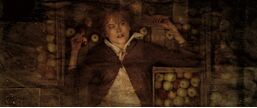When I saw a short comment saying "five stars are not enough", I liked it.
Respect and worship are my last impressions. The film seemed to shout out my inner voice, a voice that had been suppressed for a long time; it also seemed to stab a sore spot. This is mainly about the theme of the film, and I am just talking about some of my own views from this angle.
Let me start with the end of the movie. Grace meets her father, and all the suspense is revealed. The lengthy conversation she has with her father in the car is key to the film's thrust. I seem to see a dialogue between Jesus and his father, a tolerant understanding, a powerful and tyrannical one. Which kind of attitude should be taken towards human crimes, and who is more arrogant? This is the question they argue.
Grace has always disagreed with her father's values and even strongly opposed them. The father-daughter relationship is so hostile to the point of shooting, to the point of offering a bounty, to the point of being reluctant to go home after doing a vulgar job. In the end, Grace understood her father's words and accepted her father's rights and values. Tolerance cannot solve the problem of human nature; it will only degenerate human nature. On the contrary, only discipline and punishment can put human nature on the right track.
Grace has changed. Her seven little china figures are shattered, just as her hope for a better future is shattered. Treating people with a sincere heart and blindly compromising, the rewards are not always good. She did a reversal of her mind. You see her arranging to shoot the children one by one to see if the mother weeps; she kills the hypocritical boyfriend herself; she lets go of a dog. There is only one dog left in Dogtown. If man has no humanity, it is not as worthy of pity as a dog. The name of the movie, Dogtown, actually hints at the ending.
Human nature is inherently good or inherently evil. I think that's what Grace and her father were arguing about. Grace uses her own experience to explain the theory of sexual evil. Let me count the evils of human nature she encountered. The first is xenophobic indifference. Dogtown is not a hospitable place, and they won't welcome people or things that don't benefit them. Grace, who is kind to others, has indeed won the recognition of staying with her sincerity and dedication. Note that this does not mean that the villagers are hospitable, but that Grace has the value of use. At least in their opinion, Grace has made the things that can be done or not done worthwhile, which is beneficial to them. The second is laziness. It's easy to have an extra helper, and they should have done it themselves. Babysitters also become in need of taking care of a babysitter. Grace found a balance early on. Soon, a wanted notice tipped the balance, leaving her vulnerable. "Protecting her has become expensive." This is human greed.
For a weak person, her kindness and beauty have become the reason for being bullied and the key to being slandered. Then we can see the unchecked, despicable animal desires of the men in the village, the jealousy of the women in the village, and all kinds of deceit.
self-esteemGrace is a person with self-esteem. When she first entered the village, she showed no mercy. If a villager did not agree with her to stay, she would leave resolutely. When she fell in love with the life here, the life she loved punished her. She was naive and kind and thought it would get better. She had feelings for this place and for the people here, and she cherished that friendship as much as she loved those porcelain dolls. But these porcelain dolls are far from as perfect as she imagined. It was these people who made her lose her dignity and see everything clearly. The hypocritical boyfriend just didn't have the guts to possess her like other people. The anger and anger after being exposed made him no different from all the villagers in the church, dehumanizing and slandering the truth revealed by Grace. They dare not face their lost selves, but deceive themselves.
There is a church in the village, but no priest. There is hypocritical philosophical preaching in the village, but no belief.
Some people may blame Grace out of pity because she was too kind or cowardly, and gave the opportunity for despicable humanity to emerge. It's like blaming someone who was robbed for not showing money. Grace is like a Buddha who cuts flesh to feed a tiger, but a tiger may be able to feed it, but a man cannot. Greed has no limits. And once it falls, everything is so irreversible. Unlike the sour jujube tree, which turns green every year, the spring breeze cannot blow the hearts of the people of Red Dog Town.
So Grace changed from a female Jesus to her father. How will she see human beings? Contempt, ridicule, playfulness, and cruelty, conceivably, would never come to them again, never be their friend again.
This film is such an insightful depiction of human nature; what impact does it have on reality?The first is faith. Getting lost comes from the confusion of values, and tying costs to humanity is evil. It needs to be supported by complete belief. Even if there is a person with a firm belief that this kind of thing that should not happen will not happen. Faith is the cross that the creeping tiger clings to. The second is dignity and respect, the most basic needs of human existence. The "female man" I understand is actually a defense of women's dignity and respect. Women need self-strength to protect themselves because they are weak. This also shows the potential danger to women caused by the lack of social beliefs. There are different female protective colors in different eras, and this color changes according to different social beliefs, such as dignified, intellectual, and so on. Nowadays, women need to dress themselves up as a protective color of a female man. If you don't like it, then what should you do and what should society do? too much to think about.
Without Grace's arrival, Dogtown would be Dogtown; after Grace left, Dogtown would really be Dogtown. Thank you, Grace, for showing me a real dog town. Thank you for coming!
View more about Dogville reviews











